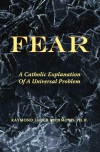|
|
|
Catholic Psychotherapy |
Spiritual Counsels |
Books |
About CSF
Introduction |
The Danger |
Mood Stabilizers |
Expansive Fantasy |
Healing from Grandiosity |
One Complication to the Healing: Religiosity |
Deceived by “Trust in God” |
Psychotherapy—not Arguing |
Medications—or Not
 HOSE who seek treatment for mania
(as in bipolar disorder) or hypomania, a less severe form of mania
(as in cyclothymic disorder) often find themselves stuck in an
unconscious philosophical
impossibility. But more about this in a bit. HOSE who seek treatment for mania
(as in bipolar disorder) or hypomania, a less severe form of mania
(as in cyclothymic disorder) often find themselves stuck in an
unconscious philosophical
impossibility. But more about this in a bit.
The Danger
Bipolar disorder
can be very dangerous. Without psychiatric medication, and under the influence
of a manic phase, a person can be tempted by powerful impulses to take risks
and engage in dangerous—even life-threatening—behaviors. Moreover,
illicit drugs, often used for self-medication, only increase the danger;
not only do they damage the brain and erode whatever self-restraint may be
alive there, but also they place the individual in dangerous social
situations.
Mood
Stabilizers
Mood stabilizers are common
medications
for mania. Lithium, for example, though not used much today, is a natural
salt that helps to stabilize a person’s mood, so that the peaks aren’t
so high and the valleys aren’t so low. It’s a fairly simple chemical
though it can have some unpleasant side effects, such as a metallic taste
in the mouth. But these side effects usually dissipate within a week or two.
A mood stabilizer also tends to have a small “window” of efficacy,
such that too little does no good and too much can be toxic; therefore, you
will need regular blood tests to monitor its serum level. All of this should
be fully and clearly explained by your prescribing
psychiatrist.
One other effect of a mood stabilizer
will be its success: you will lose the “high” of manic expansive
creativity. You won’t be a “zombie” like some persons who
must take highly sedating antipsychotic medications; you will just be
ordinary. This, in fact, brings us to that impossibility I mentioned
earlier.
Expansive
Fantasy
Even though mania has organic
causes that involve brain chemistry, mania also
has a psychological cause. Its psychodynamic roots lie in a
desire to avoid a mature understanding of life
and to escape into the pleasurable, uninhibited, and expansive aspects of life.
Any attempt to stabilize these expansive moods will feel like a grave threat to
the “part” of the personality that uses
flight into expansive fantasy as a defense against its inner
emotional pain.
Right there is the problem. That
part of you that uses “flight into expansive fantasy” as a defense against
its inner emotional pain “knows” full well (usually because of the emotional
pain of family dysfunction) that all human social
constructions are empty illusions, and so it
yearns for something “meaningful” in life. Even treatment for mania will
be seen as boring, and so your manic defense will resist the very thing you need for
your own protection. But because the manic defense is just another vain illusion like
all the other illusions it seeks to escape, it is always bound to fail.
|
Please notice
that I speak here about
unconscious
knowing, not about what you think you feel or believe
consciously.
Sadly, our entire
social structure has its unconscious basis in the
need to hide feelings of vulnerability and helplessness with
feelings of power and grandiosity. Just look at our political system, our
law-enforcement system, and our military system. It’s all filled with
overblown rhetoric and pride.
Look also at
some of our most profound social problems today. Certain elements of certain
societies feel oppressed and disavowed. So, to make themselves feel powerful,
they lash out with violent acts. Those who are
terrorized by those violent acts feel momentarily
helpless, and then they respond in turn with grandiose acts of
retaliation.
So, if our entire
culture has oriented itself around power and retaliation as a response to
fear and vulnerability, imagine how difficult it can
be for one individual to be healed from the
depression and grandiosity that result from this
unconscious cultural infection.
And that is why
Christ calls us out of what we merely think we are and, through an
experience of true love, leads us into the depths
of a pure heart. |
|
Healing from
Grandiosity
Healing from bipolar disorder,
therefore, can be difficult unless you can
disentangle yourself from the unconscious thirst
for grandiosity that surrounds you in our culture. For genuine, lasting healing,
it will be necessary to accept the true spiritual
realization that meaning cannot be found in a psychological defense;
meaning can be found only through a humble
surrender to something greater than the
“self.”
|
I willingly boast
of my weakness, that the power of Christ may rest upon me. Therefore I am
content with weakness, with mistreatment, with distress, with persecutions
and difficulties for the sake of Christ; for when I am powerless, it is then
that I am strong. |
|
|
—2 Corinthians 12:9b-10 |
|
Note, however, that Saint Paul was
able to accept his weakness because he was able to surrender himself to Christ
with total and complete humility. So be prepared for
the fact that as soon as you start to desire healing, complications will
arise.
One Complication
to the Healing:
Religiosity
Once we begin to talk about “a
humble surrender to something greater than the
self ”—as is done also in 12-step programs
for treatment of addictions—we open up an
awareness of spirituality and religion.
This spiritual
element can complicate the treatment of mania, however, because
religiosity is a common component to the manic defense of expansive
fantasy. Rather than face the pain of your childhood experiences of aloneness,
despair, darkness, and alienation, you can convince yourself that experiences of
aloneness, despair, darkness, and alienation are a grand spiritual
melodrama
swirling around you in the present. Hence, if you were to tell your
psychiatrist
that you wanted to use spiritual understanding to help you in your recovery,
the psychiatrist would most likely panic and would want to increase your
medications!
So, how can you
tell if your spiritual aspirations are genuine or if they are merely defensive?
Well, the only way is to look for their
fruits.
• |
If your spiritual
aspirations produce socially beneficial qualities in you such as love, joy, peace,
patience, kindness, generosity, faithfulness, gentleness, and self-control, then
they can be considered to be something more than a mere psychological defense, and
they can truly aid your healing. |
• |
In contrast, if you are
overcome by qualities such as anger, impatience, distractibility, impulsiveness,
demandingness, conflict, discord, and scorn for others, then you are growing weeds,
not fruit, and you are on a collision course with a devastating breakdown. |
A Second Complication
to the Healing:
Deceived by “Trust in God”
One essential aspect of genuine
religion is trust in the guidance of God. The manic defense of expansive
grandiosity, however, can deceive you into believing that you trust in God
when in reality you are merely indulging your
fantasies. By telling yourself that everything
you experience is God’s will, you can convince yourself to carry out
every impulse that pops into your head.
The problem here—just as
with the problem with Quietism—is that you
can end up committing grave sins while believing
not only that you are doing nothing wrong but also that you are doing something
holy and mystical.
What, then, can you do to nurture
a true trust in the guidance of
God?
1. |
Verify that your
intended action is in accord with the teachings
of the Church. Ask yourself if your intended action violates any of the Ten
Commandments [1]
or the directives in the Catechism of the Catholic
Church. |
2.
|
Take the time to
pray for guidance before doing anything. If you
are not absolutely certain that you are about to do God’s will, do nothing
and wait for more clarity. |
3. |
Have confidence in
saying, “God will protect me,” but understand that this protection
refers to protection from your enemies, not protection from your own reckless
lack of judgment. If you use your free will to do something foolish, don’t
expect God to violate your free will to stop
you.[2] |
Psychotherapy—not
Arguing
In intense
psychotherapy with someone who really
knows his job you can learn wisdom and humility as you
encounter them in the healing process of psychotherapy.
But until you reach that place
of full emotional commitment to looking beyond what you merely think
so as to peer deep into your unconscious motivation,
you will always be trying to argue with life (and your
psychotherapist) [3]
in the same way that dysfunctional adults argue with children.
It will seem that life, in all
its empty vanity, is treating you just
like a distracted parent treats a child: with expectations, not nurturing.
You will want desperately to rise above everything that seems foolish and,
as an expression of your deep, unconscious anger,
poke holes in it with brilliant intellect.
But, as I said above, because
the manic defense is just another vain illusion
like all the other illusions it seeks to escape, it is always bound to fail.
Moreover, all this grandiosity will open you right up to demonic
influence. To really care for your soul, your own
inner pain must be understood through the
psychotherapy, not hidden away with flashy slight-of-hand grandiose fantasies.
In essence, it will be necessary to learn to treat yourself with the honest,
compassionate, and gentle
understanding that your parents never gave to
you.
Medications—or Not
If you have been diagnosed with
Bipolar Disorder and do not like the idea of taking medications, it can be
possible to find healing without medications. But notice carefully that I said
possible, not likely. Healing without medications requires an absolute
and total surrender to God along with a desire for the purest of humility. Unless, for
the love for God, you are following the spiritual counsels
on this website, you don’t have this desire.
Needless to say, at the outset pure
humility will seem quite distasteful, more so than the taste of lithium even.
Therefore a mood stabilizer may be your easiest solution. Eventually it
will force your body to submit to it; it will effectively do to your body what
you fear to do: surrender humbly to something greater
than yourself.
|
Just remember
that psychiatric
medications are not
curative—they work only for as long as you continue to take them. No
one, really, should ever be taking psychiatric medication without also being
in psychotherapy. Psychotherapy can lead you to the roots of your unconscious
motivation where you can find a more lasting healing than day-by-day containment
with medications. |
|
So, if only you can get yourself
stabilized—if only chemically—then turn to the deep psychological
and spiritual issues and do the work to resolve them. Overcome grandiosity
by dying to it, as Christ told us to do: Take
up your cross and follow me in pure humility
through suffering, obedience, and
prayer.

Notes.
1.
Note that it is easier than you might think to violate any of the Ten
Commandments. You might say, “I’m not a murderer,” and yet,
if you desire vengeance for past injuries you are carrying
hatred in your heart, and that hatred
makes you a murderer. You might say, “I’m not an adulterer,”
and yet if you dress immodestly you are inciting
lust, and that lust makes you an adulterer. And on and on it goes.
2.
There are times when God does give us the grace of interrupting our plans.
For example, a red traffic light inconveniently makes you stop your car;
while waiting, you see a tree come crashing down in the next block, and you
realize that you would have been killed if you had not had to stop for the
signal light. Well, these sorts of things are examples of God protecting
you from your enemies. Think of them as unexpected gifts.
3.
They will even try to argue with the truth of what is said right here. Still,
I say it anyway.


Healing
|
Though
Demons
Gloat
|
Anger
&
Forgiveness
|
Falling
Families,
Fallen Children
|
Disasters
and
trauma
|
Psychology
from the
Heart
|
 |
 |
 |
 |
 |
 |
Psychological Healing
in the Catholic Mystic tradition |
True Christian
Identity
In Confronting
Evil |
How to Turn the
Emotional Wounds
of Daily Life Into
Psychological Growth. |
The Psychological
and
Spiritual Remedy
For Our Cultural
Disintegration |
The Struggle For
Psychological
and Spiritual
Growth |
Collected Texts
About the Spiritual Depth of
Clinical Psychology |
More information |
More information |
More information |
More information |
More information |
More information |
Desire
and
Distraction
|
Fear
|
Stopping
Smoking
|
Borderline
Personality
Disorder
|
Catholic
Compassion
|
 |
 |
 |
 |
 |
A Catholic Perspective
On Behavioral Change
and Its Subversion |
A Catholic Explanation
Of a Universal
Problem |
Through
Faith
and
Prayer |
Healing
the
Rage |
When They Tell You
That the Moral Teachings
of the Catholic Church
Are Wrong |
More information |
More information |
More information |
More information |
More information |
|




















